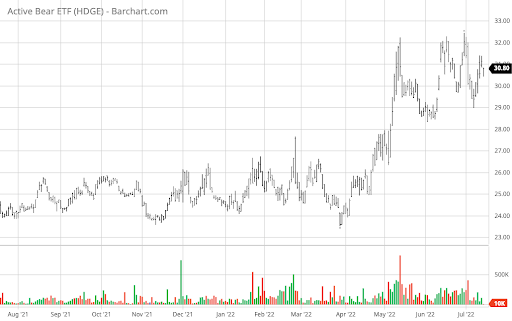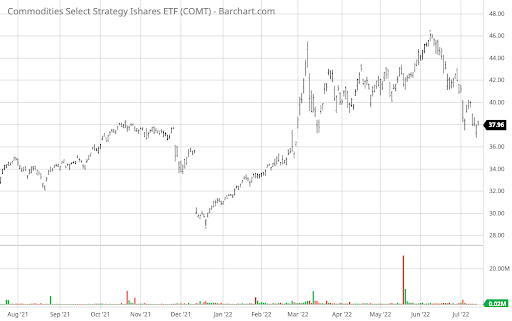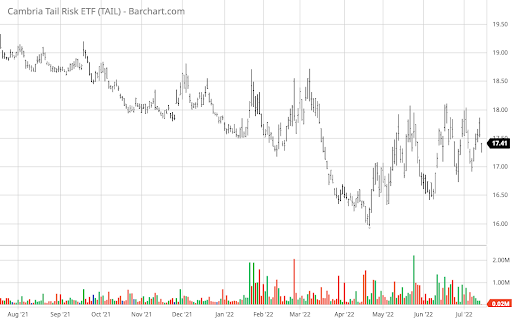The odds of the U.S. economy falling into a recession over the next 12-18 months are rising sharply, according to a growing chorus of economists and analysts. After a second unexpectedly high inflation reading, the Federal Reserve will likely accelerate its efforts to cool down the economy and could end up triggering a recession.
Let’s take a look at a few exchange-traded funds (ETFs) that could offer some level of protection during a prolonged economic downturn.
See our Active ETFs Channel to learn more about this investment vehicle and its suitability for your portfolio.
Add Short Exposure With HDGE
The AdvisorShares Ranger Equity Bear ETF (HDGE) is an actively-managed ETF that seeks capital appreciation through short sales. Using a fundamental, research-driven approach, the portfolio manager identifies securities with low earnings quality or aggressive accounting that could mask operational deterioration along with an event-driven catalyst.
During a bear market, investors can use the ETF as part of a long-short strategy by pairing it with a long index ETF. Adding short exposure can help reduce potential downside, while HDGE’s fundamentally-driven approach could generate better results than a short index fund. But, with a 2.06% adjusted expense ratio, it’s a somewhat expensive hedge.

Over the past six months, the ETF is up 23.8% versus a 16.1% decline for the SPDR S&P 500 ETF Trust (SPY). However, the fund has been far less successful during the bull market between 2019 and 2021, falling more than 60% over the past five years. As a result, investors may want to use the fund as a hedge, but perhaps not over the long term.
Invest in Commodities With COMT
The iShares GSCI Commodity Dynamic Roll Strategy ETF (COMT) tracks an index of commodities with enhanced roll selection to maximize returns. In particular, enhanced roll strategies choose the time and frequency of a roll based on a commodity’s fundamentals to achieve the highest roll yield possible rather than rolling at the same time every month.
The ETF provides an easy way to implement a multi-asset strategy to protect against the Federal Reserve’s interest rate hikes. Unlike gold or cryptocurrencies, commodities offer a tangible value that’s not tied to the U.S. dollar’s relative valuation.

The fund’s 60%+ exposure to energy commodities and 17% to agricultural commodities has helped the fund return 15.6% over the past six months and 22.8% since the beginning of the year. Moreover, unlike HDGE, the fund’s 0.48% expense ratio makes it an affordable way to add commodity exposure to your portfolio, even outside the current environment.
Hedge Against Downturns With TAIL
The Cambria Tail Risk ETF (TAIL) uses a quantitative approach to actively manage a portfolio of out-of-the-money put options purchased on the U.S. stock market. Unlike HDGE, the fund invests in broad market put options rather than short-selling specific stocks. And by timing its purchases based on volatility, it provides a cost-effective hedge.
During a bear market, the fund is an excellent way to add protection to a long portfolio without purchasing separate put options or short-selling stocks. However, the fund manager notes that it expects to produce negative returns in most years with rising markets or declining volatility, so it’s best to hold only during an expected downturn.

The fund is down 0.17% over the past six months, which is significantly better than SPY’s 16.1% drop. While it didn’t perform as well as HDGE, its index-based approach offers far less downside potential. Its 0.59% expense ratio is also far less than HDGE, providing investors with a cost-effective way to hedge their portfolios against a broad decline.
The Bottom Line
The U.S. appears likely to tip into a recession over the next 12-18 months, but a handful of ETFs could help protect your portfolio. These funds can help provide reassurance by adding short exposure or embracing a multi-asset strategy. While these strategies could sacrifice some returns over the long run, they could help reduce volatility if a recession occurs.
Take a look at our recently launched Model Portfolios to see how you can rebalance your portfolio.





